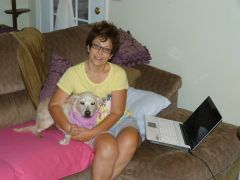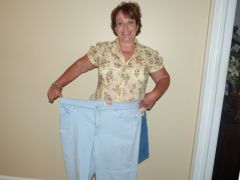-
Content Count
2,187 -
Joined
-
Last visited
-
Days Won
1
♥LovetheNewMe♥ last won the day on October 21 2012
♥LovetheNewMe♥ had the most liked content!
About ♥LovetheNewMe♥
-
Rank
♥ ♥ ♥ LOVE ♥ ♥ ♥
- Birthday 11/01/1955
About Me
-
Biography
Married, 2 grown children a boy and a girl, 3 grandchildren-Hannah, DJ and Josh. Been a nurse for 30 years, love what I do. Dream is to retire and have a home on the beach.
-
Gender
Female
-
Interests
Camping, hiking, bicycle riding and I love the Carolina and Georgia Coast.
-
Occupation
CC Nurse
-
City
Taylors
-
State
SC
-
Zip Code
29687
Recent Profile Visitors
-
Phil Penn started following ♥LovetheNewMe♥
-
-
-
 jules50 reacted to a post in a topic:
Do You Ever Feel Judged Because You Are On The "smaller" Side?
jules50 reacted to a post in a topic:
Do You Ever Feel Judged Because You Are On The "smaller" Side?
-
 Sugary Sweetheart reacted to a post in a topic:
External Psychological Reactions To Bariatric Surgery Patients
Sugary Sweetheart reacted to a post in a topic:
External Psychological Reactions To Bariatric Surgery Patients
-
-
-
-
-
-
 My Bariatric Life reacted to a post in a topic:
External Psychological Reactions To Bariatric Surgery Patients
My Bariatric Life reacted to a post in a topic:
External Psychological Reactions To Bariatric Surgery Patients
-
♥LovetheNewMe♥ started following Gaining weight, Still work in progress..., Before and After Lap Band Surgery - PICTURES ONLY and and 2 others
-


Still work in progress...
♥LovetheNewMe♥ replied to Anume 937's topic in Weight Loss Surgery Success Stories
Great job, I remember when I hit 100lbs, lost never thought I would get there! Keep up the excellent work. -


Before and After Lap Band Surgery - PICTURES ONLY
♥LovetheNewMe♥ replied to DeLarla's topic in Weight Loss Surgery Success Stories
-


Before and After Lap Band Surgery - PICTURES ONLY
♥LovetheNewMe♥ replied to DeLarla's topic in Weight Loss Surgery Success Stories
-


Before and After Lap Band Surgery - PICTURES ONLY
♥LovetheNewMe♥ replied to DeLarla's topic in Weight Loss Surgery Success Stories
-


Before and After Lap Band Surgery - PICTURES ONLY
♥LovetheNewMe♥ replied to DeLarla's topic in Weight Loss Surgery Success Stories
-
-


Banded buddy in the Georgia area (Middle GA to be exact)
♥LovetheNewMe♥ replied to Twinmom1311's topic in LAP-BAND Surgery Forums
TwinMom, I am 4 years post op. I live in Greenville SC. Inbox me on how I can help you, I would be willing to share my number if you need someone to talk to or just for support. I am also on MFP and face book. My real name is Diane. I have been around the forums off and on since banded and just checked back in. I reached goal and have good success with my band. -


First Post - 4 1/2 year post op LapBand journey Ups and Downs
♥LovetheNewMe♥ replied to JamesJ4's topic in Tell Your Weight Loss Surgery Story
James you look great, I am also 4 years 3 months post op. My spouse and I have had our ups and downs along the journey but we had a strong bond do we have made it. He was proud of my weight loss and feels like he now has a trophy wife. ( his words not mine) I am comfortable in my new body now, it took me a while but you are right it does help to have a partner to lose with. I had two friends who also had surgery, one the sleeve and one bypass. They both were Julius because I lost well, but what they failed to relieve is I worked at it day and night. Happy for you, and a great transformation. -
I am 4 years post op and I can only speak for what helped me continually lose during my journey. Always eating protein first, staying away from sliders, not eating something just because it would go down, exercising and drinking lots of water. The journey is hard and it takes time to change bad habits but with patience and perseverance you can do this. Yo-yoing is common and can be frustrating just like staying at the same weight no matter what you do. It took us years to pack on the pounds and it takes years to get it off. Good luck to you and hang in there. PS: I am at goal, it took me 2 years to loose from 262 to 122. Today I weigh 130's. I overshot my goal and needed to gain some back because I was too thin! Never thought I would say that do it is possible.
-
♥LovetheNewMe♥ started following 1 Year 127 Lbs Gone. At Goal And Then Some
-
M_8ankz started following ♥LovetheNewMe♥
-
Raven I wish you success with out your band, there are many who can not tolerate the band and have continued problems. WW is a great program and there are many people who have been very successful with that program. I can tell you even with LB the one thing that has really helped me is hiring a trainer, I feel he taught me more about nutrition and how to really listen to my body and what to eat. Learning what your body needs and how your body burns calories is key to WL with or without the band. Good luck and success with your journey.
-
 ♥LovetheNewMe♥ reacted to a comment on a blog entry:
Am I Really Hungry Or Is My Head Taking Over Again!
♥LovetheNewMe♥ reacted to a comment on a blog entry:
Am I Really Hungry Or Is My Head Taking Over Again!
-
 ♥LovetheNewMe♥ reacted to a comment on a blog entry:
Am I Really Hungry Or Is My Head Taking Over Again!
♥LovetheNewMe♥ reacted to a comment on a blog entry:
Am I Really Hungry Or Is My Head Taking Over Again!
-


This Weekend I Was So Bad.
♥LovetheNewMe♥ commented on LadyDiva618's blog entry in LadyDiva618's Blog
Confession is good, we all slip. This is life and about the journey and not about feeling guilty. The old way was to feel guilt, the new way is to admit and recognize where we went wrong and move forward. Hope your furnace if fixed and hope today was good day and this will be an awesome week. -
-


1 Year 127 Lbs Gone. At Goal And Then Some
♥LovetheNewMe♥ replied to Stephannie's topic in POST-Operation Weight Loss Surgery Q&A
Congratulations, you look amazing, so happy for your success! -
♥LovetheNewMe♥ started following Am I Really Hungry Or Is My Head Taking Over Again!
-

Am I Really Hungry Or Is My Head Taking Over Again!
♥LovetheNewMe♥ posted a blog entry in LovetheNewMe's Blog
Do you sometimes suffer from head hunger? Do you sometimes find your self munching on something and ask your self why? Do you feel remorse and quilt after you eat sometimes and don't understand why you ate that? Well you are not alone, many of us, me included still suffer from these very triggers that cause head hunger even after WLS. Our surgery did not fix our brains or stop us from putting unhealthy food in out bodies. It takes months and years and constant reminding to undo unhealthy behaviors. The one thing that can really sabotage a WLS patient is themselves. Once we start down a self destructive path we can easily justify why we are doing what we are doing. How many of you have lied to your self about taking just one bite, when you really ate the who thing? Grazers sometimes have more difficulty with WLS than binge eaters. It is much easier to graze then it is to binge after WLS that is why it is so important to learn what your eating triggers are and to learn how to deal with head hunger early in your journey. I often surf the internet looking for ideas that may help me to stay true to my healthy self and like to share with others in thoughts that it may help someone else. Everyone has to individulize their journey and has to learn how they can best cope with this change in life style. Some of the tips for dealing with head hunger suggests things that if you are a WLS person like myself, you cannot do. We cannot bulk up on low calorie foods or eat big salads, we cannot drink soup before our protein meals to fill us up and we cannot drink large volumes of water at one time when we are eating. If these things worked for us we would not have had WLS. As a bariatric patient we must learn to deal with our triggers and behaviors that sabatoge us. I found what I consider a good article this morning that I would like to share with all of you. The article is from the Obesity Help web site. http://www.obesityhelp.com/forums/mental-health/Head-Hunger-Coping-with-Your-Triggers-for-Overeating.html Head Hunger - Coping with Your Triggers for Overeating by Michelle May, MD Do you sometimes confuse “head hunger” with “body hunger”? If you’re sensitive to food cues, weight management becomes much easier when you’re able to recognize the triggers in your environment and break the associations that lead you to overeat simply out of habit. Let’s take a look at just a few of the common triggers for overeating and strategies for coping more effectively. By the Clock: Society programs us to follow a schedule, so like Pavlov’s dog, we’ve learned to salivate when the bell rings. The reality is that it’s more convenient to eat at certain times than others, so it takes effort to listen to your hunger cues. Strategy: Though it’s challenging to change this routine, you can adapt it to fit your own needs. Learn to pace yourself by observing your natural hunger rhythms. You’ll probably notice that you get hungry every three to six hours, depending on what and how much you ate at your last meal and how active you’ve been. Keep a healthy snack handy to satisfy hunger that doesn’t conform to mealtimes. If you’re consistently tempted to snack right before a meal, consider moving the mealtime up or adding more protein to your previous snack. High-Risk Times: Many people have times of the day that are high-risk for overeating. For example, you may experience a late-afternoon energy slump or a tendency to munch when you come home from work to transition into your evening. Strategy: Know when you’re most at risk and develop an alternate strategy. For example, create a Recharge Ritual or Transition Time that helps you relax or unwind. Save a favorite magazine or book to read, call a friend or walk your dog instead. Create a list of things to do instead of eating. Keep the list (and any necessary supplies) handy and make a commitment to try one of these activities before eating simply out of habit. ‘Tis the Season: Be aware of your seasonal and weather-related cues for eating. Holidays can be especially difficult because of all of the social ties to certain foods and even certain people. Many of the foods you eat during this time may seem “special,” and therefore, harder to eat in sensible quantities. Strategy: These occasions repeat themselves, so you can anticipate what typically occurs and create a plan for dealing with your triggers. Make it a point to really listen to your body instead of the external cues when making your food choices. Also, keep in mind that special foods will be even more special when you eat them mindfully when you’re hungry, focusing on the appearance and flavors of the food, the ambiance, the other people and the reason you’re all together. Tempting Displays: Seeing displays of food like candy or nuts in dishes and tempting foods when you open your cabinet or refrigerator can trigger you to want those foods. Strategy: Out of sight, out of mind. Don’t use food as decorations or leave appetizing foods in plain view. Try putting tempting foods behind other foods in your cabinets and refrigerator. If a co-worker keeps food out, ask him or her to put it in a drawer instead. Media: Food is everywhere in television and magazines (ironically, often right next to the articles about the latest wonder diet!). Strategy: Get yourself a glass of water during commercials, avoid watching programs that focus on food and skip quickly over the food ads and recipes. Break the habit of eating while watching television—usually a mindless, high-calorie activity. Location, Location, Location: If you eat in front of the TV, in bed or standing in the kitchen, you may feel an urge to eat just from being in those places. Strategy: Try to eat only while sitting at a table. Make it a family rule to limit eating to one or two rooms in the house. This will decrease triggers like TV and reading and help you focus on enjoying your food without distractions. Biggie Size: Restaurants often serve overly large portions to make their customers feel that they are getting value. Strategy: Be prepared to have extra food wrapped up to go as soon as you feel satisfied, or estimate how much you think you’ll need and wrap up the rest even before you start eating. If you leave the food sitting in front of you, you’ll be more likely to keep nibbling. Remind yourself that you’ll get to enjoy that food again when you’re hungry. You can also share an entrée or order an appetizer-sized portion. Forbidden Food Syndrome: Although it’s a popular topic of conversation, the mere discussion of dieting can trigger feelings of deprivation and cravings. Just thinking about restrictive dieting has been shown to increase food intake. Strategy: Decrease the amount of time you spend talking about food, weight and dieting. Depend on your physical hunger cues to let you know when it’s time to eat. By learning to recognize and cope more effectively with your head hunger, you’ll begin to break free from old, problematic habits. You’ll find yourself eating less, feeling more satisfied and meeting your needs more appropriately. To get a one-page handout called “101 Things to Do Instead of Eating When You’re NOT Hungry,” visit http://amihungry.com/enews.shtml. Food and Feelings Emotions are common triggers for eating. People sometimes eat to cope with stress, distract themselves from difficult emotions or stuff down feelings they don’t know how to express in a healthier manner. However, boredom, anger, anxiety, loneliness, stress and other feelings are a natural part of our lives, and eating won’t make them go away. In fact, eating in response to these feelings disconnects you from important information about what you need. For example, “I want brownies” might really mean “I want comfort,” “I need a reward,” “I wish I had a friend to talk to” or “I wish I could tell you how I really feel.” The food you eat to deal with feelings comes with strings attached—weight gain and regret. But more importantly, it denies you the opportunity to discover and satisfy your true needs. Since eating cannot meet your emotional needs, those unmet needs trigger overeating again and again. The way to break out of this pattern is to stop judging yourself when you overeat and instead try to figure out what you needed that drove you to eat when you weren’t physically hungry. Examining your current eating behavior can be a powerful source of information about your inner self and your true needs and wants. Once you have identified the emotions that triggered the urge to eat, seek ways to comfort, nurture, calm and distract yourself without turning to food. Michelle May, MD, a physician and recovered yo-yo dieter, is the author of Am I Hungry? What to Do When Diets Don’t Work, available at www.AmIHungry.com. -
-
-
-
Congratulations on hitting one of your goals. Keep up the good work!
-
-
Raven, I can identfy with how you felt when you looked at the pictures. I weighed 160 plus at my highest but I am shorter than you and when I first started losing and had lost about 60 lbs or so I thought I would look a lot smaller than I did in pictures. I had a really hard time with body image and it took me a really long time to accept I was thiner. As far as no losing and not being able to eat. Honestly you have to be able to eat to lose witht he band, my personal experience has been the more protein I could eat the better I lost weight. It took me a long time to really understand how my body burned calories, for a long time I ate 1000 calories or less and did not understand why I did not lose weight. Hang in there and just continue to montior your protein intake and increase your activity. It really is more that just watching what you eat, it is portion control, mix of protein and carbs and how your metabolism burns the calories. Just keep working at it, I bought a fit bite and it helped me to really understand calorie in and out and how my body burned calories. Good luck to you.































